Shed Read online
Shed
a novel by
Jason McIntyre
Published by The Farthest Reaches
Copyright © 2010 Jason McIntyre
All rights reserved. Without limiting the rights under copyright reserved above, no part of this publication may be reproduced, stored in or introduced into a retrieval system, or transmitted, in any form, or by any means (electronic, mechanical, photocopying, recording, or otherwise) without the prior written permission of both the copyright owner and the above publisher of this book. Thank you for respecting the work of this author.
Fiction titles by Jason McIntyre
On The Gathering Storm
Thalo Blue
Walkout
Mercy and the Cat
Black Light of Day: A Collection
Nights Gone By: A Collection
The Night Walk Men: A Novella
The Devil’s Right Hand: A Night Walk Men Novel
Corinthian: A Night Walk Men Story
Kro: A Night Walk Men Story
Dovetail Cove titles by Jason McIntyre
1. Deathbed (Dovetail Cove, 1971)
2. Bled (Dovetail Cove, 1972)
3. Fled (Dovetail Cove, 1973)
4. Redhead (Dovetail Cove, 1974)
5. Zed (Dovetail Cove, 1975)
6. Unwed (Dovetail Cove, 1976)
7. Shed (Dovetail Cove, 1977)
8. Dread (Dovetail Cove, 1978)
9. Instead (Dovetail Cove, 1979)
- 10. [COMING SOON] (Dovetail Cove, 1980) -
Learn more about the author and his work at:
www.theFarthestReaches.com
Dovetail Cove
April 17th, 1977
Part I
Simon and Rupert
1.
Simon and I lay in the dark, peering into the blackness of the basement around us. My eyes were opened wide but I couldn’t even make out the lines on the wallboard or the doorway at the foot of the bed. The heat of the day had surrendered and it was cool there in the quiet beneath the earth. I had to hold my breath at times to stop from shivering. There was a small square of hazy, barely visible light coming from behind the window above us but it offered almost no illumination at all. I looked up and imagined the street lamp that stood way down at the end of the drive. Its light was blurred out by the tall weeping willows and the enormous distance between the house and the road. What was to go on down here was beyond that world on the other side of those trees—beyond the light itself—and I wished at that moment that those trees were not there so I could see my brother’s face and know what he was thinking. We were both there in that darkness, stripped down to our underwear, laying still on the mattress side by side saying nothing and breathing shallowly. There was only one sheet on the bed and we lay on top of it. Here on the island during the summer, it gets hot but it is substantially cooler down here, especially at night. I don’t know whether it was the night air of the basement pressing in on me or just the waiting but I simply couldn’t help it any longer; I finally began to shiver.
“Don’t move now, Rupe,” Simon told me, “Don’t even shiver. It’s gonna happen soon . . . You can’t even shiver. You hear me, Rupe?”
“Uh-huh. I won’t move, Simon. I promise.”
I looked up to my older brother as little brothers often do. I always had. What he said I didn’t question. He didn’t tell me why we were laying there on a bare sheet with all the other blankets pushed off into the corner of the room. And even though we were laying there in the pitch dark with scarcely a thread of clothing on, I didn’t ask once. I just trusted him.
2.
My memories of my big brother during that time are so clear, even now. Simon was a quiet, unassuming boy. That much was obvious to everyone in town, to everyone at school, to Mama, and even to me. He never felt the need to make his thoughts known to anyone who didn’t want to hear them and he never spoke out of turn. At least, he tried not to after Mama married Everett.
It never really surprised me that my brother was so quiet. I never thought much of it. After Daddy died, we both had little to say, even to each other. Mama started seeing Everett and he was around pretty much all the time starting about two years before Simon began seventh grade. Simon and I hated him from the start.
Everett worked at Ethan’s Shop near the docks. He was a hull welder, an odds n’ sods man. Whenever boats came in needing hulls patched or equipment re-soldered to decks after a storm Everett was called in for double shifts. Fishing was the lifeblood for most everybody on the island in the late seventies and the fisheries were the heart’s blood of our little community, bringing in as many loads as they could. Every other service and industry was secondary in those days and as a result anyone tied to the boats and lobster trawlers -- and the men who worked them -- was regarded almost as a local hero. Everett, by association I suppose, was highly respected for his work, even if he was somewhat lazy. Simon and I didn’t understand what everyone saw in him. We didn’t really get the silent respect he garnered from the town, but we accepted him as best we could, since he was to be our new dad.
I guess it was the idea of a regular paycheque, at least for our mama, that made him seem appealing. When he proposed marriage to her he promised Mama that she and her two boys would never go hungry and he told her that he loved her more than any man ever could.
But that wasn’t true. Our daddy loved Mama, loved her more than life itself and more than Everett ever would. Daddy had been an electrician, his father one before him, and between the two of them they had installed almost every power box and length of wire on the island since early 1942. Daddy took on the family business after granddaddy’s death which was a few years before I was even born; he eked out a living for us by taking care of whatever electrical services were needed on the island. Mama arrived from the mainland in 1965 fresh from high school for a job at the newspaper as a typesetter. Her uncle was a newspaper man and had known Edwin Barstow, the editor of ‘The Island Press’, for some time. She’d had a strong leaning towards books and writing ever since she was a child and seemed a natural at the newspaper. She had even hoped of becoming a respected reporter someday just as her father had been. The two of them, my daddy and my mama, met at Harlow’s Grocery on Main Street her first week in town when they both reached for the same filet in the cooler by the checkout. They both laughed at the absurdity and their romance began that summer. Soon they dashed off to the mainland, scooting around the country in a little brown and white bowler trailer towed behind Granddaddy’s old Buick. Mama’s eyes used to light up when she’d tell Simon and me that story and we loved listening every single time she told it.
Theirs was one of those movie loves, one of those unbreakable ones that you know will never burn out. I knew it even then, even when I was just a little kid. So, what Everett told her wasn’t true. Although I can understand why she might have believed it to be at the time. He was awfully sincere for those first few months. And after Daddy had died she was in dire straits, I’ll tell you that much. She didn’t have any idea how she was going to make the payments on the small house that Daddy and her had bought before Simon was born. And keep us fed by herself. She was sick with worry and sick with sorrow. The paper had closed down some years before, was replaced by a mainland gazette which was shipped over by boat in the afternoons, and Mama had no experience in any other line of work. Other than cooking and cleaning, she had no other skills. And, with most everyone at bare wages from shipping and the fishing boats, scarcely anyone at all could afford to hire a cleaning lady. Along came Everett with his shined boots, slicked back hair, some flowers picked out of the neighbour’s garden, and his regular paycheque from Ethan’s. I guess that was almost all she needed.
3.
Everett was eager to make a good imp
ression right from the start and he let us know just how important we all were to him. After the spring wedding, Everett took a couple of weeks off work during the slow season and started tinkering down in the basement of our lathe and plaster bungalow on the north side of town.
Before his death Daddy had begun teaching Simon the basics of electrical wiring and had framed in a small bedroom down there. He had hoped to have his eldest son wire in the light fixture, two electrical outlets and a light switch as the first lesson in a string that would eventually ensure Simon coming on board at the family business. It would have been a good way for him to start learning the tricks of the trade on a small scale. After all, he was only eleven at the time. But someday, Daddy must have thought, Simon would take over that business as the next generation of island electrician. And he surely wanted my brother prepared for it. Circumstances, as cold as they were, didn’t allow Daddy to finish the room and the outlets and switch box sat nailed into the studs of the skeletal bedroom for nearly a year.
Everett saw the unfinished project as a great opportunity to show his new wife how dedicated he’d be to her sons as their new daddy. By finishing the bedroom for Simon and having it ready for him to move into by the summer, he thought Mama would see just how much he cared for her. And for her boys.
The thing was, though, that Everett didn’t have the first clue about how to wire in those outlets and light switch. He didn’t know a ground wire from his arsehole and had no intention of asking for help. When Simon approached him one day after school and suggested that the black ground wire was indeed supposed to connect to the corresponding black wire from the power circuit, Everett exploded at him. He began ranting and raving about how it was impossible that Simon, a mere boy, would presume to know more about anything than he did. The look in his eyes that day was crazed and as he leaned menacingly over my frightened brother I thought he was going to hit him. Up to that day I’d never seen Simon look so small and helpless. He was truly scared of Everett for the first time right then.
As a result of Everett’s flaring temper, his ignorance of basic wiring and his laziness, his idea of a finished bedroom was to salvage some damaged wallboard from the discount bin at Parson’s Hardware and hammer it up onto the already finished frame—right over the outlet boxes and the unconnected wiring running roughly down from the upstairs breaker box. He threw some scraps of carpet down on the floor and moved Simon’s bunk down to the basement room. Then he pinned a length of copper wire across the doorway with two finishing nails and hung a piece of hastily cut material with little baseball players on it over that. This, I suppose, was to be Simon’s new bedroom door.
The switch for the only light in the entire basement was at the top of the stairs on the other side of the door. It turned on and off a light bulb that hung on a wire over Daddy’s workbench on the opposite half of the basement, across from the cellar which occupied the northwest corner. When he had moved into the house Everett had assumed this to be his new work area and it was now cluttered with his projects, mostly junk near as Simon and I could tell. The light from that bulb spilled into Simon’s room but it was dim and when bedtime came, Everett would click off the switch at the top of the stairwell and close the basement door for the night.
Simon’s new bedroom occupied the area between the stairway and the southwest wall. And underneath the stairs, connecting to Simon’s room was a makeshift closet. Everett hung a matching piece of baseball fabric across the doorway there and called the matching effect of the two doorways ‘interior decorating’. Pleased with himself, he took a swig of his remaining warm beer, put his hammer back in his silver toolkit, locked it, and went upstairs to watch the evening news on the black and white set in the living room. Simon and I looked around the room, at the crooked wallboard and the cloth doors, and we snickered to each other.
4.
The real problem, and the crux of everything, lay behind that second piece of white, pinstriped cloth, the one with the small uniformed baseball players on it, swinging bats and catching fly balls. The island experienced extremely hot summers and cool winters with lots of rain. The frequent rainfall meant that most every one of the bungalows and two-story homes in town had a sump hole which filled with excess run-off from around the foundation. Underground there was a long, narrow corridor of cement which routed directly into the sump hole. This corridor sat about halfway down the depth of the hole and fed it by trickling water into its basin until it was full. The idea was for this excess water to be taken out of the basement area and moved away from the house so it wouldn’t seep into the foundation causing pressure cracking and flooding. Set into most of these sump holes was an electric pump to take care of that. Ours had a large cork sinker attached by a wire to the motor which sat above the hole and when the water rose to a level high enough to lift that sinker, the wire would pull a small lever and the engine would turn on.
The sump pump in our old house hadn’t been replaced in many years. In fact, I would guess that it was the original pump from when the cindercrete block foundation had been laid more than twenty years earlier. The motor was old, but it never failed. We’d only had a flooded basement once in all the years that I could remember. The pump was as dependable as daddy had been—likely because he had taken such good care of it, removing it from its resting place in the sump hole each spring and giving it a good overhaul. When there was a summer thunderstorm or a brisk spring shower that motor turned on without hesitation and pumped all the water in the sump hole through the hose that ran out to the field of sweet grass behind the house. It was pretty loud, though. When it ran in the middle of the night it would wake Simon and me in our bunk beds upstairs at the opposite end of the small house.
You could hear almost everything in that little house. The stairs had a tremendous squeak in every board and you could trace every step up or down no matter where you were in the house. Sometimes when mama was cooking dinner, Simon and I would hear her go down to the cellar for some more potatoes or an onion. When she reached the bottom we knew we had at least a minute or so while she rummaged in the cellar bin for some nice sized white potatoes. We would tip-toe as fast as we could out to the kitchen and sneak a couple of cookies or a few uncooked carrots. When her foot fall squeaked on the first stair of her climb back up to the kitchen, we knew we only had a few seconds left before we were caught. As we got older and bigger, she’d hear us racing across the upstairs as the floor boards themselves all had squeaks too. The squeaks would betray our sneaking into the kitchen and mama would appear at the door to our room with hands on her hip and say, “You little rascals! You two‘ve been sneaking cookies. I can see the crumbs on your faces.” But she could barely hold the stern look. It would first give way to a small, crooked grin and then quickly become a warm smile. She simply could not hide it from her two boys. She’d rush into the room and wrap her arms around the both of us, pretending to be some kind of a monster, but instead smothering us with kisses and hugs. We loved our mama and as we got older we began to realize that we meant everything to her. She did everything she could to make sure we were brought up right. It became really hard for her the winter Daddy died but it became much more trying for her the summer after she married Everett.
5.
“Let your body feel the cold, Rupe. Let it feel the cold but don’t you dare shiver,” Simon whispered to me as we lay there that summer night in the dark, waiting. He was adamant but he didn’t risk raising his voice. If we woke Everett upstairs we’d have hell to pay. We both knew it, so anything we said was in the lowest possible whisper.
I didn’t reply to Simon this time. I couldn’t. I didn’t know what I could tell him. It’s a strange thing: I suppose a body gets used to laying under a sheet at night and when it doesn’t feel the familiar weight of fabric pressing down over it, it can suddenly feel exceedingly unnatural. I convinced myself that this alien feeling was the problem, that I really couldn’t be cold enough to shiver. Instead of answering, I just bore down on my self and I
controlled my shivers. His silence was his praise.
We had been laying there for what seemed an eternity. But there was no clock in that basement room. Even if there had been, we wouldn’t have been able to see it. It was darker down there than I could have possibly imagined it would be. I was close to understanding then why Simon had been so unwilling to stay down there after his first horrible night two summers ago. I’d heard him cry out from the basement room, and he bawled as he raced up the stairs all the way to Mama and Everett’s bedroom, screaming about the dark. Mama had put on the light and did her best to comfort him but Everett was too upset to try and understand the problem. We soon learned not to upset Everett.
On the other end of the house, Mama and Everett were presumably sleeping. We’d heard them up there earlier as we lay in the dark trying not to sleep just yet. Everett had told me at supper that I’d be spending the night with my brother in the basement so that he and Mama could have some time alone. It was her birthday, he said, and he had some “special plans” prepared for that evening. I didn’t know what that meant, but I hoped, for Mama’s sake, that it was better than his anniversary meal. He’d brought home a tin take-out pan of fried chicken from Harvey’s Diner on Broadway. Simon and I didn’t eat much that night. We love Harvey’s chicken and it was a rare treat around our house but Simon told me it would be better if I saved it for lunch the next day. We had to eat light, he told me.
I didn’t understand a lot of things back then. I wished that I had. I didn’t understand why Mama and Everett wanted time alone. I didn’t understand why fried chicken was a no-no when we hadn’t had any rain yet by that evening and I didn’t understand why we had to lay there in the dark in our underwear. I was about to pipe up and finally ask Simon to tell me why all of these things had to be when the sump pump motor started up.

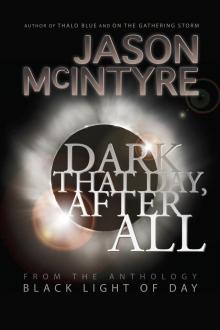 Dark That Day, After All
Dark That Day, After All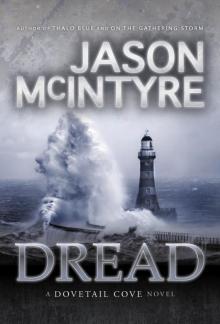 Dread
Dread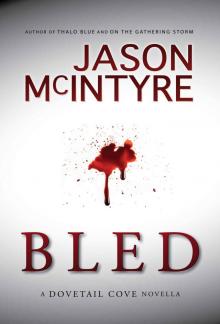 Bled
Bled Instead
Instead Fled
Fled Fled (Dovetail Cove, 1973) (Dovetail Cove Series)
Fled (Dovetail Cove, 1973) (Dovetail Cove Series) Zed
Zed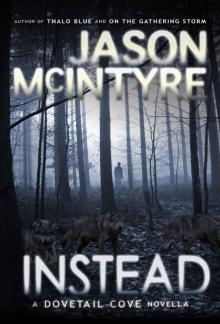 Instead (Dovetail Cove, 1979) (Dovetail Cove Series)
Instead (Dovetail Cove, 1979) (Dovetail Cove Series)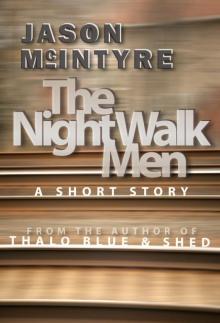 The Night Walk Men
The Night Walk Men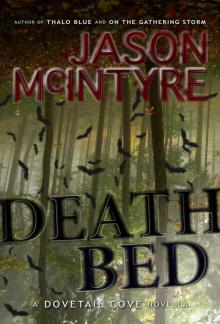 Deathbed (Dovetail Cove, 1971) (Dovetail Cove Series)
Deathbed (Dovetail Cove, 1971) (Dovetail Cove Series)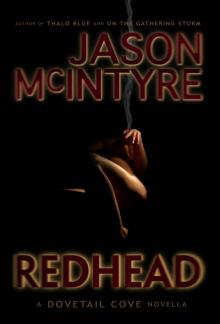 Redhead (Dovetail Cove, 1974) (Dovetail Cove Series)
Redhead (Dovetail Cove, 1974) (Dovetail Cove Series)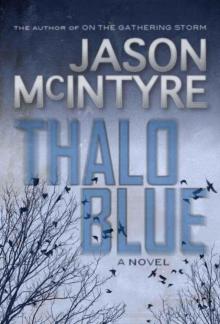 Thalo Blue
Thalo Blue Shed
Shed Shed (Dovetail Cove, 1977) (Dovetail Cove Series)
Shed (Dovetail Cove, 1977) (Dovetail Cove Series)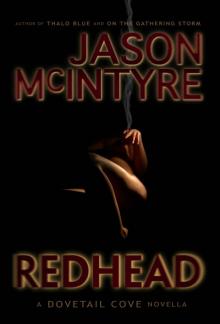 Redhead
Redhead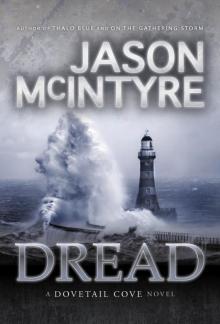 Dread (Dovetail Cove, 1978) (Dovetail Cove Series)
Dread (Dovetail Cove, 1978) (Dovetail Cove Series) Zed (Dovetail Cove, 1975) (Dovetail Cove Series)
Zed (Dovetail Cove, 1975) (Dovetail Cove Series)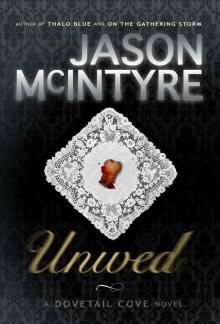 Unwed (Dovetail Cove, 1976) (Dovetail Cove Series)
Unwed (Dovetail Cove, 1976) (Dovetail Cove Series)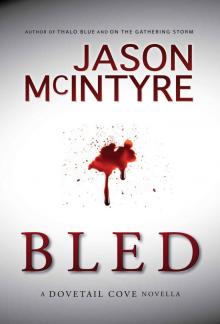 Bled (Dovetail Cove, 1972) (Dovetail Cove Series)
Bled (Dovetail Cove, 1972) (Dovetail Cove Series)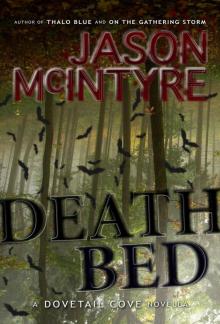 Deathbed
Deathbed